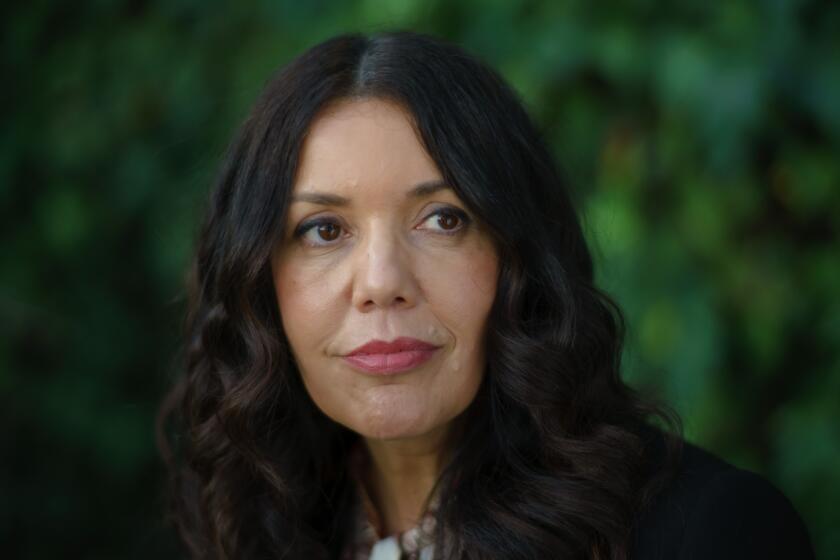Why risk launching a whole new TV series when you can build on an existing one?

- Share via
“Dick Wolf and I were in Chicago for the shooting of the ‘Chicago Fire’ pilot, freezing ... our asses off on this bridge, and Dick was saying, ‘We’ll do a medical show next, and we’ll have three of these on the air in the next three years,’” recalls Peter Jankowski, who now executive produces NBC’s “Chicago Fire,” “Chicago Med” and “Chicago P.D.” “It took four years, though.”
Once upon a time, the notion of three shows on the air under the same brand, taking up an entire night of prime-time broadcast real estate — which the “Chicago” shows do — would have been an extraordinary feat. But in this extended golden era of 500-plus TV series on multiple platforms, the “Chicago” story is really a keeping-up-with-the-Joneses exercise. More and more creators and networks are turning not to original content for new programming but to expanding the universes they already have.
It was 50 years ago that “Star Trek” died.
“Television has allowed shows to tell more nuanced stories than you could tell in a two-hour [feature film],” says “Star Trek: Picard” and “Star Trek: Discovery” (CBS All Access) executive producer Alex Kurtzman. “The world of expanding universes, between Pixar, Marvel, ‘Star Wars,’ DC [Comics] has really enabled people to think more broadly about storytelling than ever before. And thinking about long-term story is a gift, because you get to dig deeper.”
“Star Trek” producers are uniquely familiar with the power of the multiverse; different iterations of the original series’ universe have appeared on screens big and small for more than 50 years. Today, CBS All Access also features the upcoming animated series “Lower Decks,” Nickelodeon has the animated “Prodigy” and there are two more live action shows in “deep development,” says Kurtzman.

Trailer for Season 1 of “Star Trek: Picard” (CBS All Access)
This new kind of spinoff comes with special challenges, which has led to some studios responding by creating a new kind of showrunner. AMC’s “The Walking Dead” universe (which includes the original, “Fear the Walking Dead” and new limited series “The World Beyond”) moved former “TWD” showrunner Scott M. Gimple into a “spoke of the wheel” position as chief content officer for the whole shebang in 2018.
“It’s pretty collaborative,” Gimple says of the dynamic among the shows, which are housed in the same building. “I meet with the showrunners regularly, and there’s a lot of organic conversations there. But we’ve had to finesse things — we don’t want to double up [on story], and it pushes us into finding more original angles.”
AMC Networks President Sarah Barnett on “The Walking Dead,” “Killing Eve” and the new slate she’s bringing to AMC, BBC America, Sundance and IFC.
Often, those original angles are birthed from established canon. “Better Call Saul” executive producers Peter Gould and Vince Gilligan (the team behind “Saul” mothership “Breaking Bad”) discovered this when trying to spin “Saul” from “Bad.” (Gilligan also wrote and directed last year’s “El Camino: A Breaking Bad Movie.”)
“There was a throwaway line in ‘Breaking Bad,’ where Saul said as he was about to leave New Mexico, that the best case scenario for him was he’d be running a Cinnabon in a month,” recalls Gould. When “Saul” premiered in 2015, that’s exactly where they placed their protagonist: at a Cinnabon.
“The primal question is, ‘What’s in his past that got him here, and what can we use that got him here?’” says Gilligan. “In the writers room, we use this expression: building on bedrock. A universe is going to grow by definition, but I don’t like growing it by adding places and things willy-nilly.”

“Better Call Saul” co-creator Peter Gould discusses the pressure of living up to the legacy of “Breaking Bad” at the Envelope Live.
ABC’s “Grey’s Anatomy” and “Station 19” share adjacent writers rooms, and executive producer Krista Vernoff has a writer on both staffs who keeps her in the loop. So when one show pitches an idea (while characters in “Station” are camping, there’s a bear attack) the other can pick up the thread (the attack victim gets patched up on “Anatomy”).
“Creatively, it’s exciting, because it doubles your world of characters to play with,” says Vernoff.
Still, new spinoffs have to be careful not to trip on their own feet: ABC’s “Ish” universe of “black-ish and “Mixed-ish” (“Grown-ish” is on Freeform) made a discovery once “Mixed-ish” began airing in 2019: “When you have a spinoff like this, you’re giving one of your main character’s backstories,” says showrunner Courtney Lilly. “And it’s like, ‘Wait, they’re doing something that takes away some of our narrative.’ We hadn’t thought about it that much. We’re in communication a lot more now.”
So why are spinoffs supersized now? The answer goes back to the start: With 500-plus shows to choose from, rising above the chaos is more critical than ever.
“It’s really hard to break through the noise and launch a show these days,” says “The Goldbergs” and spinoff “Schooled” executive producer Doug Robinson. “Having a fan base, particularly having ‘Goldbergs’ at 8 and ‘Schooled’ at 8:30, you can expand the universe and ask the audience to stay for another half hour.”
“The people who pay for the shows keep that in mind quite a bit,” says Gimple. “There’s us, the dreamers, the people from the basement who’ve played video games and read comics and want to see all these stories — and then there are the folks who pay for it. Luckily, they’re excited. And we get to take a new journey.”
Five seasoned entertainment journalists predict the shows and performances the Television Academy will honor with Emmys; do you agree with their picks?

The cast and crew of ABC’s “black-ish” discuss issues of identity.
More to Read
The complete guide to home viewing
Get Screen Gab for everything about the TV shows and streaming movies everyone’s talking about.
You may occasionally receive promotional content from the Los Angeles Times.







